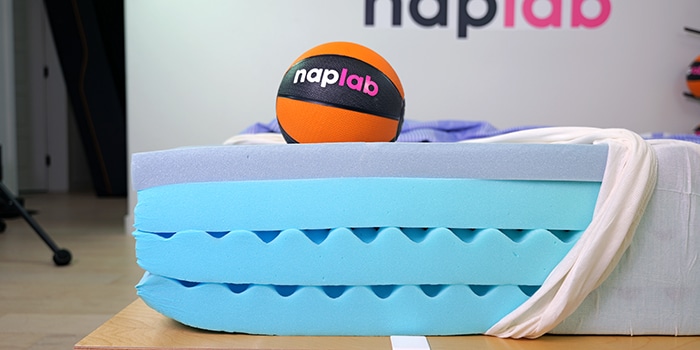
Best For
- Ultra-low price point, under $400 for a queen
- Fast material response time
Considerations
- Higher levels of heat retention
- Mediocre support when lying at the edge of the mattress
- Significant pressure relief issues, especially for heavier weighted bodies or back / stomach sleepers
Our Verdict
The Vibe mattress is a low-cost 11″ memory foam mattress made of a combination of memory foam, poly foam, and support foam. It is designed to appeal to sleepers on a very tight budget who are willing to accept the performance disadvantages in order to obtain the super low price tag.
This mattress has deep sinkage and very low levels of bounce.
It comes in a single firmness, 7 out of 10, giving the mattress a slightly firm feel.
In our performance tests, this mattress earned a below-average performance of 7.38. However, the price is also considerable lower than average as well.
Type: Memory Foam
Firmness: Slightly Firm (7)
Best For: All Sleeping Positions, All Body Weights
In This Review
Performance Tests | Firmness | Support & Sleeping Positions | Design | Materials | Comparisons | FAQs
Performance Tests
At NapLab, we put each mattress to the test.
We test 10 different factors that impact the performance, comfort, and value of the mattress. We then take the results of that test and compare to every mattress we’ve tested to date.
Check out the full performance table below to see how this mattress ranks:
| Factor | Vibe | Average |
|---|---|---|
| Overall Score | 7.38 | 8.55 |
| Price (Queen) | $361 | $1,087 (Memory Foam only) |
| Cooling – Score | 7.0 | 8.7 |
| Sinkage – Depth | 2.31″ | 2.14″ |
| Sinkage – Feel | Deep | Moderate |
| Motion Transfer – Score | 7.5 | 8.1 |
| Motion Transfer – Acceleration | 10.58 m/s² | 8.79 m/s² |
| Response Time – Score | 9.6 | 9.0 |
| Response Time – Mostly Recovered | 0.2 sec. | 0.4 sec. |
| Response Time – Fully Recovered | 0.8 sec. | 0.9 sec. |
| Bounce – Height | 5.67″ | 9.60″ |
| Bounce – Feel | Very Low | Moderate |
| Edge Support – Score | 7.2 | 8.6 |
| Edge Support – Sitting | 4.25″ | 4.02″ |
| Edge Support – Lying | Mediocre | Good |
| Sex – Score | 6.7 | 8.5 |
| Pressure Relief – Score | 6.0 | 8.7 |
| Comfort Layer Thickness | 2.0″ | 4.1″ |
| Mattress Thickness | 11″ | 12.0″ |
| Off-Gassing – Score | 8.1 | 8.1 |
| Off-Gassing – Smell | Strong | Strong |
| Off-Gassing – Days | 7 days | 7 days |
| Company – Score | 9.0 | 8.8 |
| Trial | 100 nights | 175 nights |
| Warranty | 10 years | 24% have lifetime warranties, average of other 76% of mattresses is 13 years |
How is Vibe Different?
The Vibe is an ultra-budget friendly memory foam mattress with below-average performance, but also a below-average price point under $400, which is an extremely hard target for many mattress manufacturers to hit.
This mattress costs only $367 for a queen, 67% less than the cost of the average memory foam mattress ($1,087).
Advantages
Besides the super low price the only other real advantage is the faster material response time.
Neutral Factors
Neutral factors of this mattress include deep sinkage and very low levels of bounce. Besides the surprisingly fast material response time, this mattress looks and feels like a traditional budget memory foam mattress.
Disadvantages
The Vibe struggles with higher levels of heat retention and poor cooling performance, 20% more motion transfer than average, and worse edge support both when sitting and lying.
It is 11″ thick, 1″ thinner than average and with a thinner comfort layer (only 2.0″ of comfort material compared to 4.1″ on the average mattress). This hurts both the sex score as well as the pressure relief score.
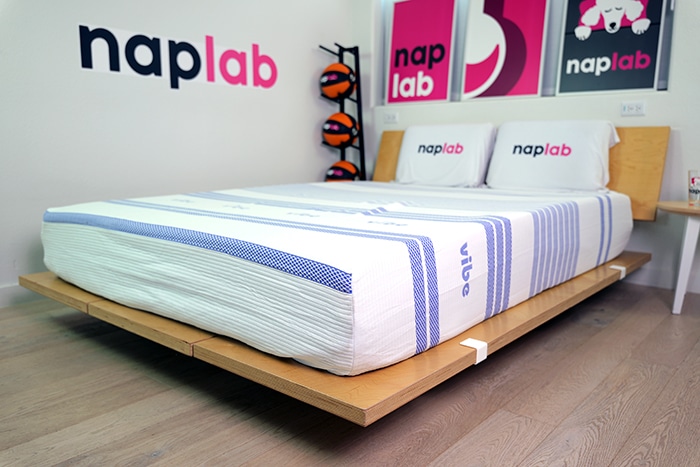
Cooling Test
The Vibe mattress has a fair level of cooling performance. During our tests, I felt a moderate level of heat retention around my body.
Baseline Temp.
72.7° F
Max Temp.
90.2° F
Ending Temp.
79.7° F
Ultimately, we have a fairly simple all foam construction. The foams are quite basic and they appear to struggle more with heat retention and breathability.
Given the price point, this makes perfect sense and is exactly what we’d expect.
Max Temp.
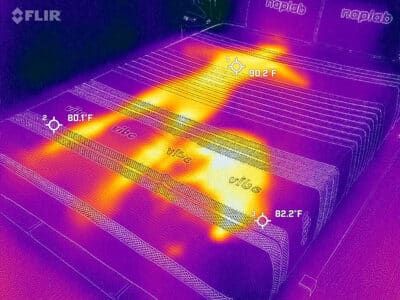
Ending Temp
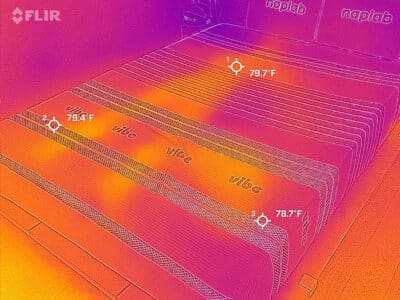
- Baseline Temperature – the temperature of the mattress before anyone lies on it
- Maximum Temperature (0 minute) – the temperature of the mattress after lying on it for 15 minutes
- Ending Temperature (5 minute) – the temperature of the mattress after being lied upon and having no one on it for 5 minutes
Lastly, the mattress is topped with a 2.0” memory foam. None of the design or material choices are doing any significant favors for cooling.
The Vibe does use a gel memory foam, but it doesn’t appear to be having a sizable impact on cooling.
In our objective temperature tests, we measured a max surface level temperature of 90.2° F, which is 0.5° warmer than the average of 89.7°, based on all of our tests to date.
Heat Dissipation Over Time
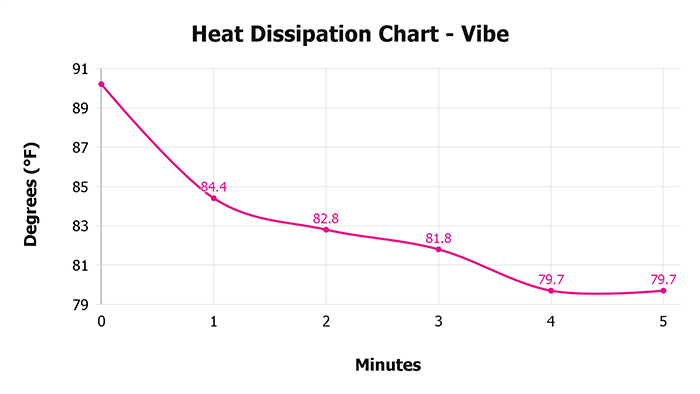
When we consider the complete picture of objective data, subjective experience, and an analysis of the materials, I’m confident most sleepers will find the cooling performance to be fair at best.
Sinkage Test
The Vibe has a deep level of sinkage. During our tests, we measured 2.31” of pressure point sinkage. This is 0.17” deeper than the average sinkage depth of 2.14”, based on all of our tests.
Sinkage Depth
2.31″
Sinkage Feel
Deep
Body Contour
Dramatic
The level of sinkage is documented in the image below.
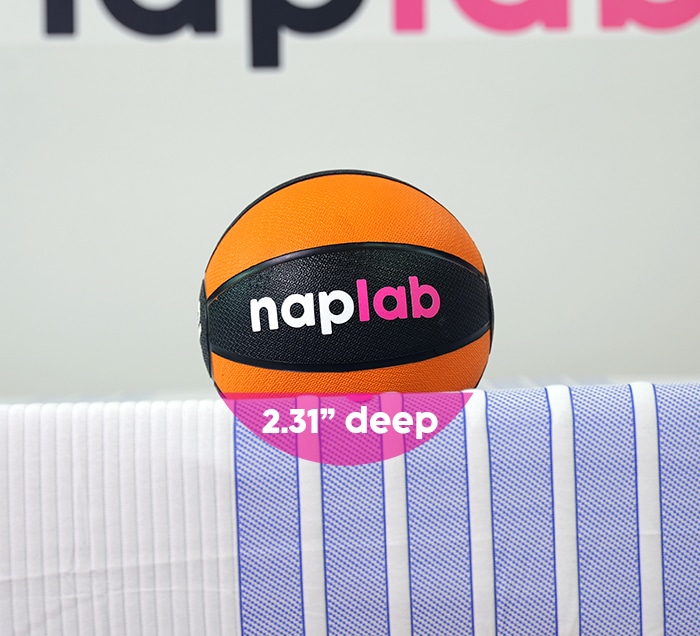
The mattress has a classic memory foam feel with a more dramatic body contouring hug. However, the hug doesn’t feel overly enveloping.
This is due to the slightly firm feel, faster material response, and the mattress creating more of a floating feel for lighter parts of the body.
These parts of the body lie more “on” the mattress as opposed to sinking down “in” the mattress. That said, heavier parts of the body do sink down more.
Motion Transfer Test
The Vibe mattress has a moderate level of motion transfer. During our tests, we measured an acceleration range of 10.58 m/s². This is 20% more motion transfer than the average of 8.79 m/s².
Accel. Range
10.58 m/s²
Motion Duration
0.71 seconds
Typically, all foam mattresses, especially those topped with memory foam, create less motion. Foams do a great job compared to most coil and hybrid mattresses when it comes to dispersing energy.
However, the Vibe mattress struggled more with motion than we expected. In my view, the slightly firm feel on the mattress is creating much of the initial motion.
The level of motion transfer is also documented in the video below.
In our motion transfer chart, we can see the highest motion from 0 to 0.14 seconds. After 0.14 seconds motion plummets to virtually nothing and by 0.71 seconds we’re at near zero levels of energy.
Motion Transfer Over Time
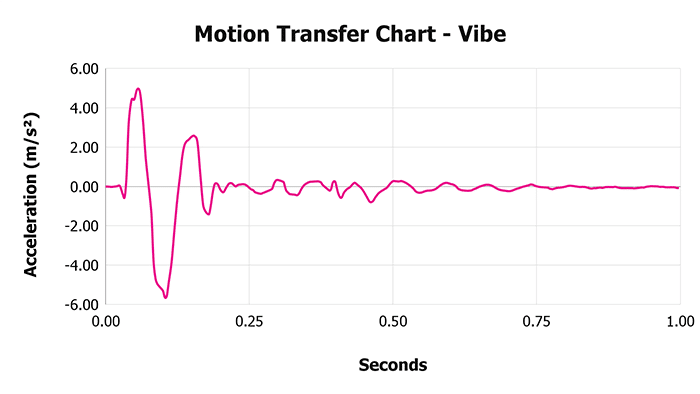
While the initial motion spike is far from ideal, the motion duration is excellent. Yes, it does take 0.71 seconds to return to near-zero levels, however, by 0.21 seconds the vast bulk of the motion has subsided.
Overall, I’m pleased with the level of motion and I don’t expect it to be an issue for most sleepers.
Response Test
The Vibe has a very fast material response time. In our mostly recovered test, we measured a recovery speed of 0.2 seconds. This is 0.2 seconds faster than the average of 0.4 seconds.
Mostly Recovered
0.2 sec.
Complete Recovery
0.8 sec.
In our fully recovered test, we measured a recovery speed of 0.8 seconds, which is 0.1 seconds faster than the average of 0.9 seconds.
While the mostly recovered speed is fast as it gets, the time to fully rebound back to shape was a touch slower.
The level of responsiveness is documented in the video below.
Mind you, it’s not slow by any stretch, but it is slower than the fastest responsiveness mattresses, which are 0.3 seconds to fully recover.
A faster material response helps sleepers not feel stuck on the mattress and makes it easier to move around on the mattress.
More traditional memory foam can take 3-5 seconds to rebound back to shape. Suffice to say, the Vibe is notably faster than that and I don’t expect responsiveness will be an issue for most sleepers.
Bounce Test
The Vibe has a very low level of bounce. During our tests, we measured a total bounce height of 5.67”. This is 3.93” less bounce than the average of 9.60”, based on all of our tests to date.
The combination of all foam design and memory foam on top are greatly reducing the level of bounce. The lower bounce makes it more difficult to move around on the mattress.
Max. Depth
4.89″
Max. Rebound
0.78″
Total Bounce
5.67″
Max. Sinkage Depth
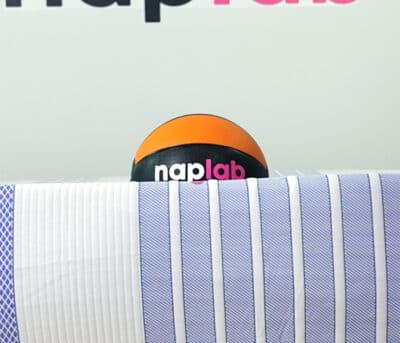
Max Bounce Height
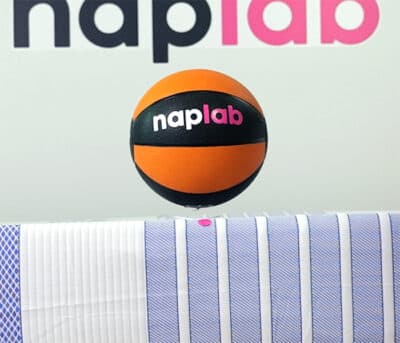
The level of bounce is also documented in the video below.
The ease of movement is improved by faster material response and the slightly firm feel. However, where the low bounce has the most impact is for sex performance.
Higher bounce is essential for amorous activities and this is an area the Vibe really struggles in.
Edge Support Test
The Vibe has good edge support for sitting, but mediocre edge support for lying. In our sitting edge support tests, we measured a sitting sinkage compression of 4.25”. This is 0.23” more sitting sinkage than the average of 4.02”, based on all of our tests to date.
Max. Sinkage
4.25″
Lying Support
Mediocre
Reinforced Edge
No
The slightly firmer feel and 11” total profile are both definitely helping to create better sitting edge support performance.
The level of edge support while seated is documented in the images below.
Sitting, 140 lbs.
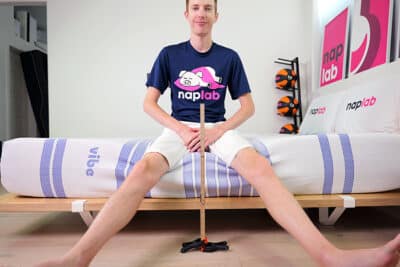
Sitting, 200 lbs.
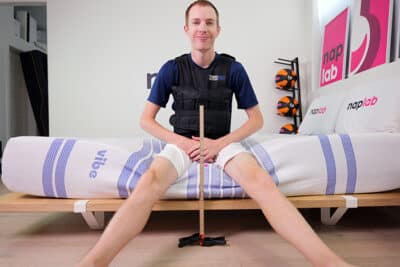
That said, lying edge support left much to be desired. While lying directly on the edge of the mattress I did not feel as well supported.
The level of edge support while lying is documented in the images below.
Lying on Edge, 140 lbs.
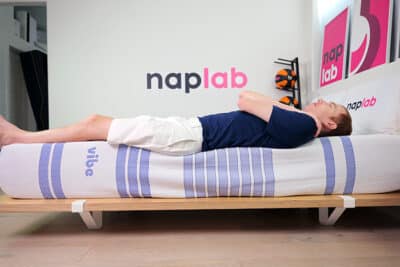
Lying on Edge, 200 lbs.
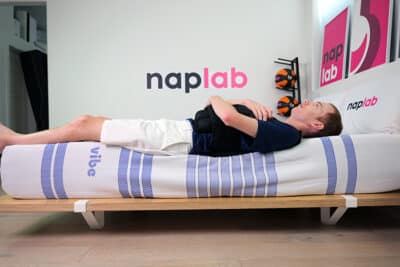
In my view, the problem is simply the memory foam comfort layer, which is creating a more notable hug and contour.
When you have this type of more dramatic contouring at the edge of the mattress it creates a weakening of support at the edge.
In addition, the mattress doesn’t have any type of reinforced edge support foam, which is negatively impacting edge support performance. Overall, edge support is a mixed bag. While sitting edge support is solid, lying edge support just isn’t good.
Sex Test
The Vibe mattress has a mediocre level of sex performance. On the positive side, the all-foam design allows the mattress to keep noise levels low. In addition, sitting edge support is reasonably good, keeping the score in the green.
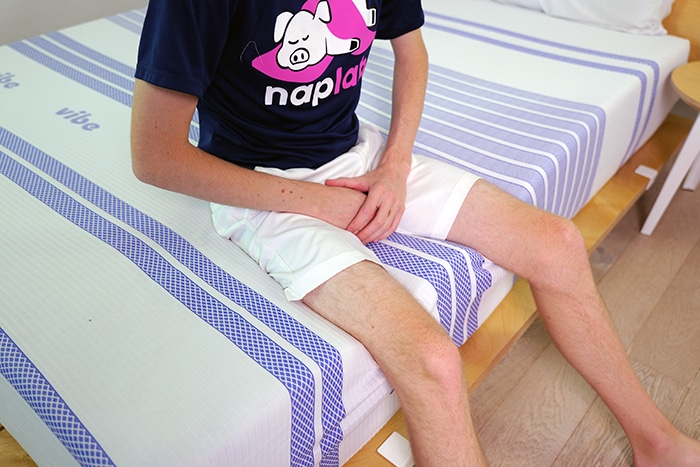
However, pressure relief is mediocre, cooling performance is fair, and most notably the mattress only creates a low level of bounce. At just 5.67” of bounce the Vibe just doesn’t create sufficient bounce for ideal amorous activities.
| Sex Factor | Factor Weight | Score | Rating |
|---|---|---|---|
| Bounce | 65% | 6.0 | Low |
| Edge Support | 20% | 8.4 | Good |
| Noise | 5% | 10 | Minimal |
| Pressure Relief | 5% | 6.0 | Mediocre |
| Cooling | 5% | 7.0 | Fair |
The all-foam design and memory foam comfort layer soak up most of the energy, returning little bounce.
The result is a mattress that just doesn’t work with sex participants and instead makes the dance without pants more strenuous, difficult, and tiring.
Pressure Relief Test
The Vibe mattress has a mediocre level of pressure relief. During our tests, I felt significant pressure points on my body. Fundamentally, the mattress has a materials problem.
Comfort Layer
2.0″
Support Layer
9.0″
We have just 2.0” of comfort material. This is significantly thinner than the average 4.1” comfort layer, based on all of our tests. In addition, the foam quality of both comfort foam and support foam layers simply isn’t great.
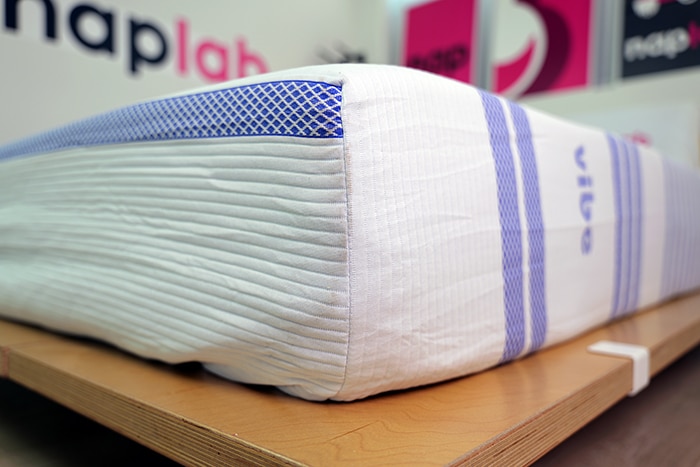
The foams look and feel basic and I worry about their long-term durability. During our tests I found the foams to be uncomfortable and create notable undue pressure points in multiple sleeping positions.
When we consider the material quality, material thickness, and my subjective experience on the mattress I’m confident in my view that the Vibe mattress has a mediocre level of pressure relief.
Pressure Map – Side Sleepers
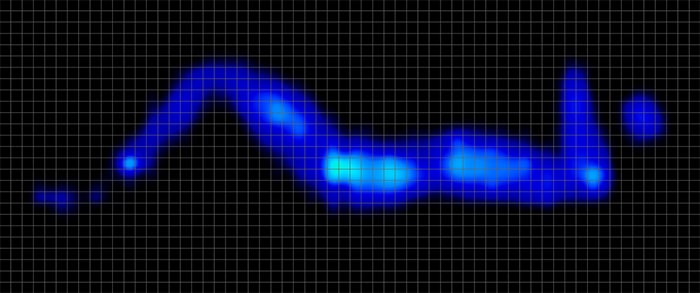
| Pressure Relief (PSI) | Average | Maximum |
|---|---|---|
| Side Sleepers | 0.21 | 0.97 |
Pressure Map – Back Sleepers
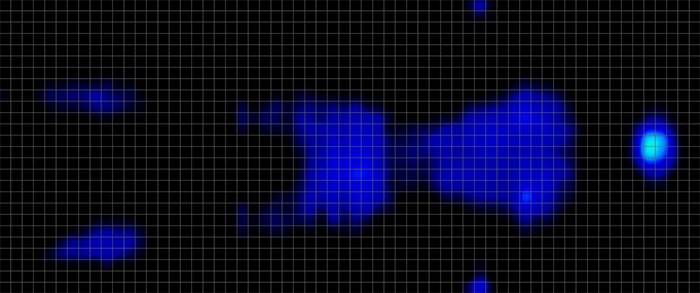
| Pressure Relief (PSI) | Average | Maximum |
|---|---|---|
| Back Sleepers | 0.12 | 0.95 |
Pressure Map – Stomach Sleepers
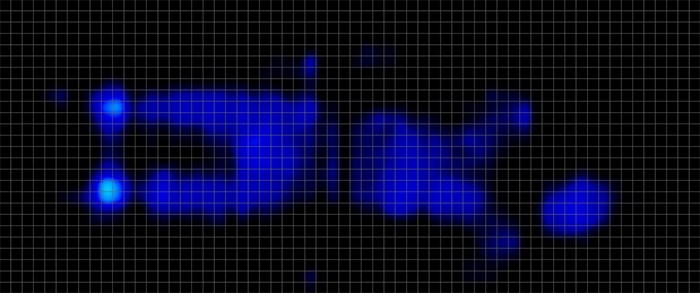
| Pressure Relief (PSI) | Average | Maximum |
|---|---|---|
| Stomach Sleepers | 0.10 | 0.81 |
Off-Gassing Test
Off-gassing on the Vibe mattress is strong right out of the box and the odor lasted for 7 days.
Initial Smell Strength
Strong
Off-Gassing Period
7 days
This is right on par with the average off-gassing duration (7 days) and really shouldn’t be a huge issue for most sleepers.
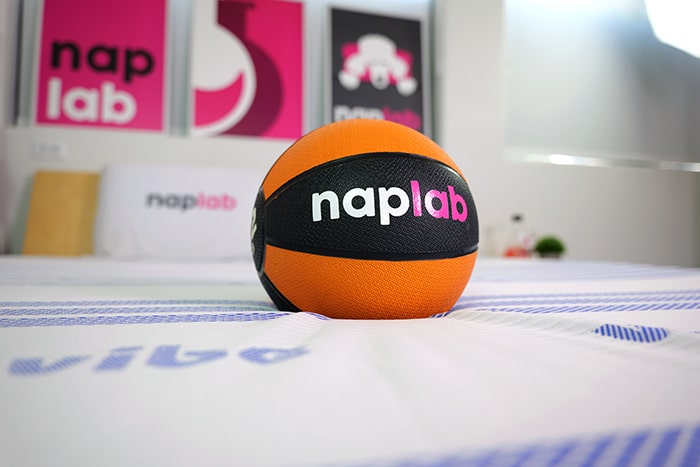
Company
Vibe mattresses come with a 100-night trial period on their mattress as well as a 10-year warranty. Shipping and returns are free.
| Company Factor | Factor Weight | Score | Data |
|---|---|---|---|
| Returns | 40% | 10 | $0 |
| Trial Period | 30% | 8.0 | 100 nights |
| Warranty | 20% | 8.0 | 10 years |
| Shipping | 10% | 10 | $0 |
| Country of Origin | 0% | USA |
Comparing over 250+ mattresses tested to date, this trial is shorter than average (average is 173 nights) and the warranty is also shorter. Concerning warranties, 24% of mattresses tested have lifetime warranties and the average of the other 76% of mattresses is 13 years.
Who Owns Vibe?
Vibe is owned by Kimberly LLC, after its original owner, Classic Brands, was liquidated in 2023.
A partnering company, Sinomax USA, came to an agreement with Kimberly LLC allowing Sinomax USA to manufacture the Vibe mattress at their factories in both Tennessee and Arizona.
How firm is the Vibe?
The Vibe mattress is available in a single firmness, 7 out of 10, giving the mattress a slightly firm feel.

Support & Sleeping Positions
The Vibe has a mediocre level of support. During our tests, I felt that the mattress was supportive, but it was also plagued by pressure relief issues.
| Support Factor | Data |
|---|---|
| Comfort Layer | 2.0″ |
| Support Layer | 9.0″ |
| Firmness | Slightly Firm |
| Body Contour | Dramatic |
| Zoned Support | No |
| Reinforced Edge | No |
For a mattress to feel supportive it needs to create a neutral spinal alignment and also avoid pressure points.
The Vibe simply didn’t deliver when it came to pressure point issues.
If you are unable to lie in the same position for an extended period of time without pressure points developing then there will be correlated support issues for sleepers. That is the case for the Vibe.
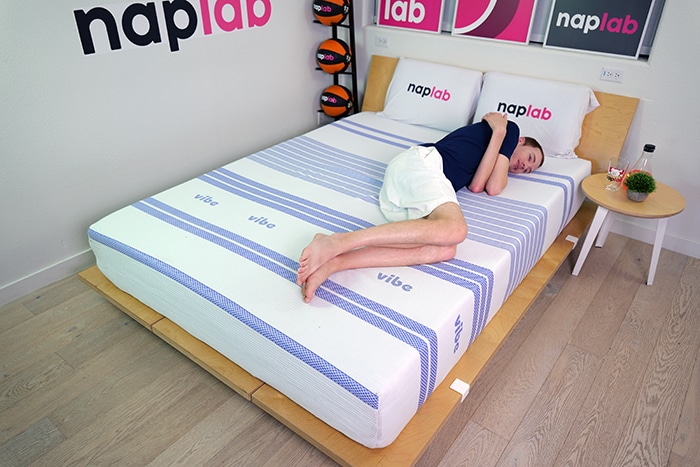
The Vibe has a 9.0” support layer, split across 3 different foams. The foam thickness is notably thicker than the average support layer thickness, which is 7.9”, based on all of our tests.
Had the Vibe been topped with a higher performance memory foam layer and/or a thicker comfort layer that could have helped to remedy both comfort and support issues. Unfortunately, we don’t see that.
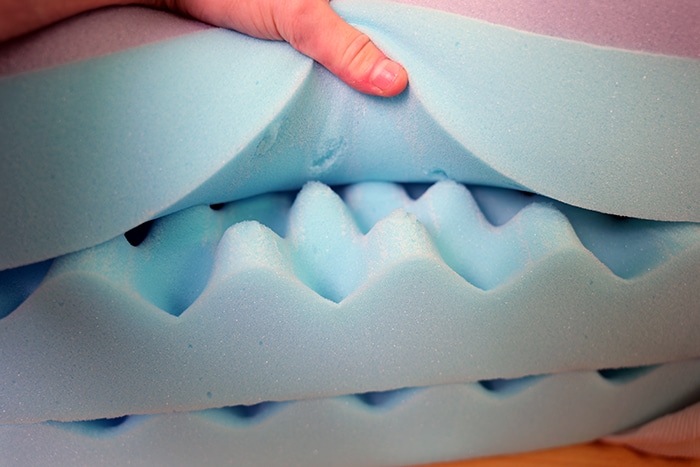
When I consider our pressure relief tests, my subjective experience, and an analysis of the materials, I’m confident in my view that support is mediocre at best.
Check out the table below to see the sleeper weights and sleeping positions that would be best suited for this mattress.
| Sleeper Weight | Stomach Sleepers | Side Sleepers | Back Sleepers |
|---|---|---|---|
| Under 150 lbs. | Maybe | No | Maybe |
| 150-250 lbs. | Maybe | No | Maybe |
| 250-300 lbs. | Maybe | No | Maybe |
Design
The Vibe is an 11″ memory foam mattress with a slightly firm feel. According the the manufacturer, the mattress is 12″ thick, but in our tests we only measured 11″ of materials.
| Design Factor | Data |
|---|---|
| Type | Memory Foam |
| Thickness | 11″ |
| Cover Type | Thin |
| Weight | 57 lbs. |
| Has Handles | No |
| Fiberglass-Free | Yes |
| Ships in a Box | Yes |
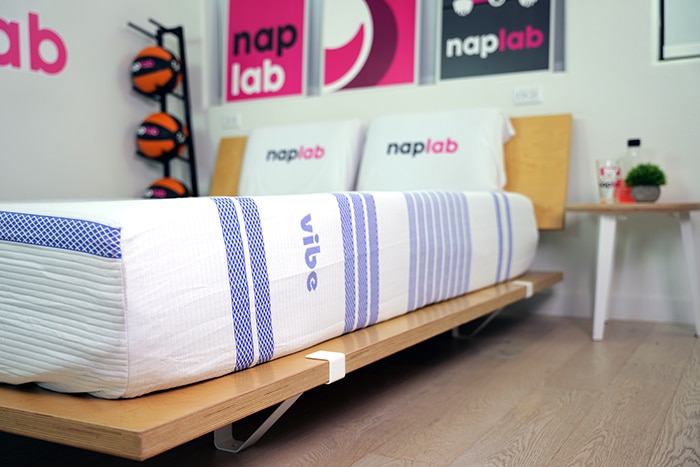
Materials
Being an all-foam mattress, the Vibe uses four layers of foam to provide the comfort and support dynamics happening on this mattress. From top to bottom, the layers include:
| Layer Type | Thickness | Layer Specs |
|---|---|---|
| Memory Foam | 2.0″ | Not Available |
| Poly Foam | 2.75″ | Not Available |
| Support Foam | 3.25″ | Not Available |
| Support Foam | 3.0″ | Not Available |
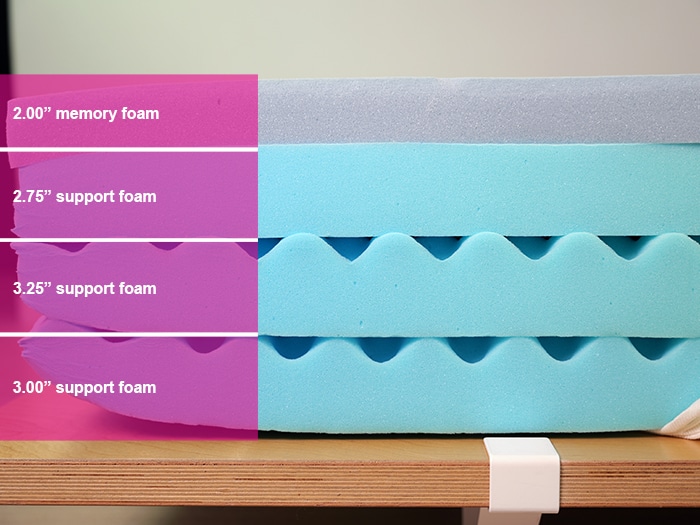
The Law Tag outlines the full breakdown of materials included in this mattress.
- Materials
- 83% polyurethane foam
- 17% viscoelastic polyurethane foam
- Cover
- 100% polyester
- 100% polyurethane foam pad embedded with gel beads
- Made for: Sinomax USA, INC. 3151 Briarpark Dr. Suite 1220 Houston, TX 77042 USA
- Date of Delivery:
- Finished Size: 60 x 80 x 12 in
- Net Weight of Filling Mat: 51 lbs.
- Manufactured by: Sinomax USA East INC. 1740 J.P. Hennessey Dr. Lavergne, TN 37086
- Date of Manufacture: May 09 2024
- Model: 410263-11XX
The Cover
The cover of the Vibe mattress is thin and made of polyester. It is a simple design with the Vibe trademark printed across the bottom 1/3 of the mattress with a striped design.
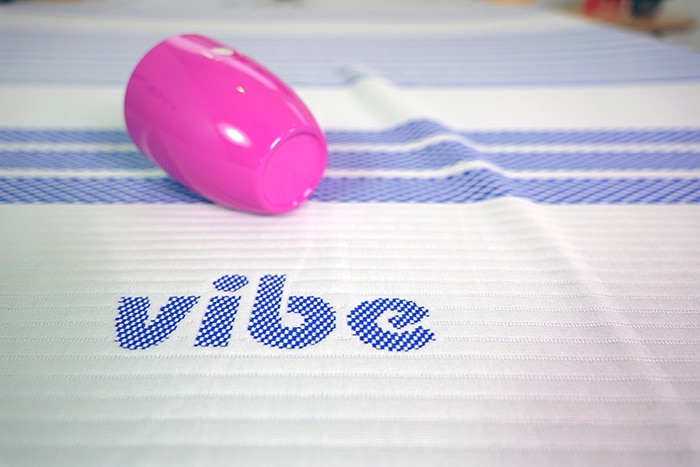
The Comfort Layer
The comfort layer is made up of two layers of foam, a 2.0″ gel memory foam followed by a 2.75″ support foam (3.0″ according to the manufacturer).
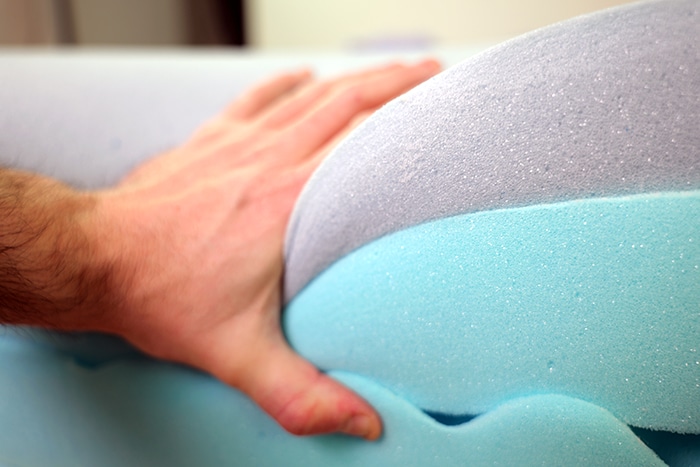
The Support Layer
The support layer also includes two layers of foam. There is a 3.25″ convoluted support foam followed by a secondary 3.0″ convoluted support foam.
According to the manufacturer, both of these layers are intended to be 3.5″ thick, which they both fall short of.
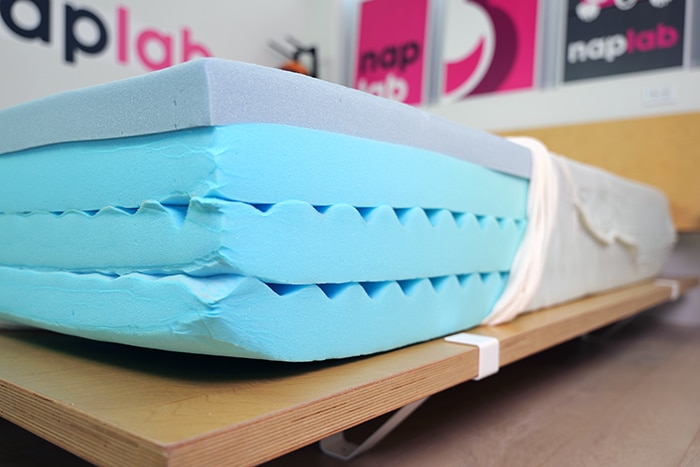
Product Evolution
The Vibe mattress first hit the market in 2020. The material and design is substantially similar today to what it was when the mattress first launched.
The biggest change to Vibe was the change in ownership. Vibe’s original owner (Kimberly LLC) sold vibe to Sinomax USA in 2023.
Despite the change in ownership, the layers, materials, and design appear to have largely stayed the same.
Other Mattresses to Consider
Not sure if the Vibe is the right pick for you? Check out these three other top-rated memory foam mattresses for high-performing alternatives you may want to consider.
For Performance
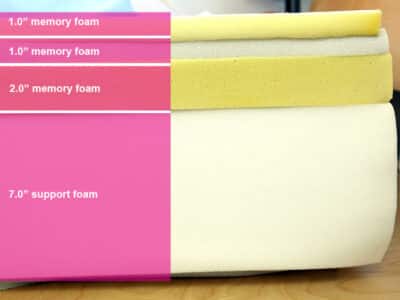
Novosbed
Low Bounce & Minimal Sinkage
The Novosbed is an 11″ memory foam mattress. It has minimal sinkage, low bounce, and is available in three firmness levels—soft, medium-firm, and firm. While the price is definitely higher than Vibe, you’re getting a much higher quality mattress that outperforms Vibe in 7 out of 8 performance tests.
For Value
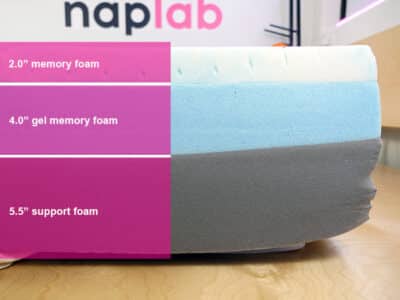
Sweet Night Dreamy
6.0″ Comfort Layer
The Sweet Night Dreamy is an 11.5″ memory foam mattress. It has a 2.0″ memory foam layer, a 4.0″ gel memory foam transitional layer, and a 5.5″ support foam layer. It offers moderate sinkage and very low levels of bounce for under $400. If you’re looking for better performance without spending more money, the Dreamy is a nice option.
For Balanced Feel
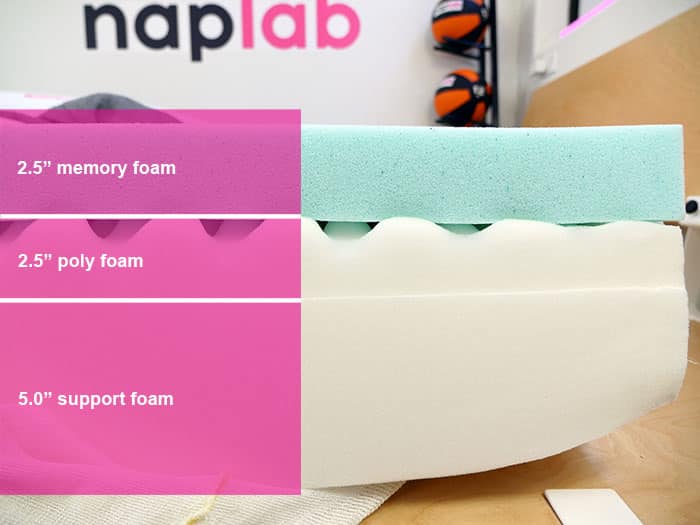
Siena
Medium-Firm Memory Foam
The Siena is a 10″ mattress that contains a combination of memory foam, and support foam. This mattress has a balanced feel, firmness of 6 out of 10, and a reasonable price tag—$399 for a queen. If you’re looking for better pressure relief and less motion transfer, the Siena is a fantastic option.
Frequently Asked Questions
Still have questions? Check out some of the top FAQs on the Vibe mattress below and get the answers you’re looking for.
How much does a Vibe mattress cost?
Here are the current prices, with any sales or promotions reflected below:
Twin: $353
Twin XL: $270
Full: $310
Queen: $350
King: $402
Cal. King: $499
*Note: Sales prices are subject to change without notice or warning.
Does the Vibe mattress contain fiberglass?
According to the product page on Amazon, the Vibe Gel Memory Foam Mattress is fiberglass-free. That being said, earlier reports from consumers stated that the manufacturer did, in fact, contain fiberglass. It’s possible that the manufacturer originally used fiberglass and at some point discontinued using it.




